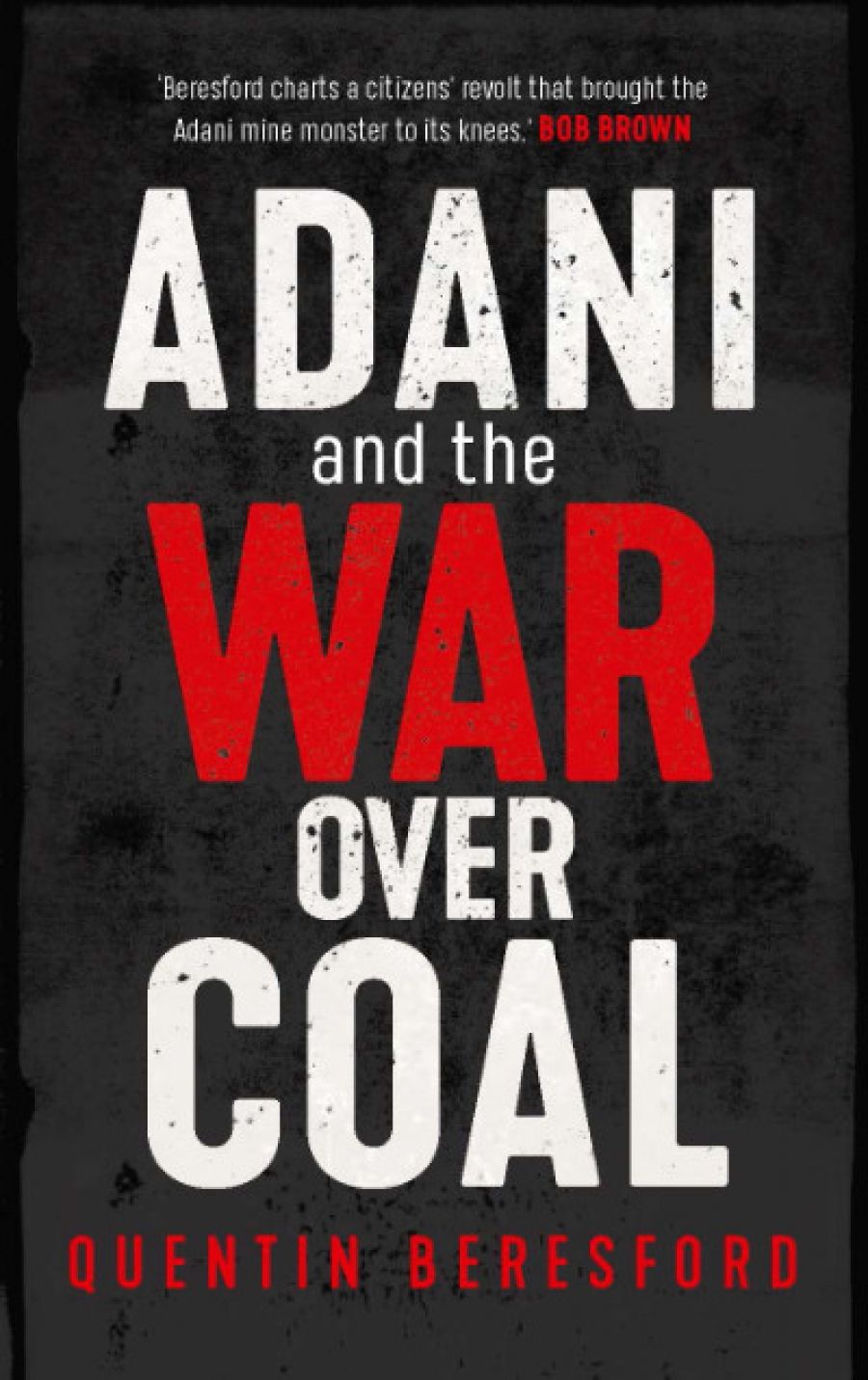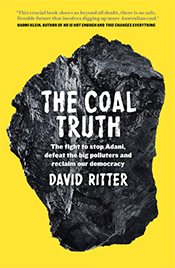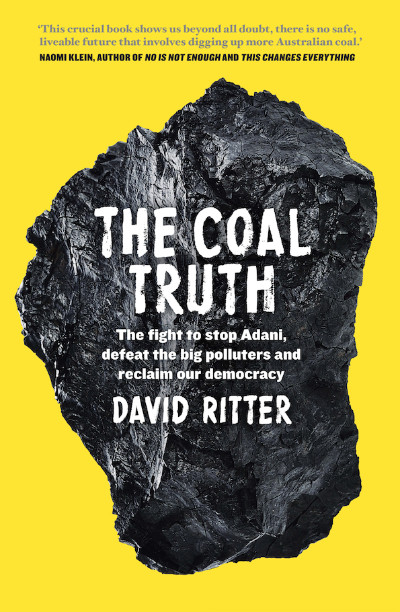
- Free Article: Yes
- Contents Category: Environmental Studies
- Custom Article Title: Susan Reid reviews 'Adani and the War Over Coal' by Quentin Beresford
- Review Article: Yes
- Custom Highlight Text:
Who can forget the image of Scott Morrison, as federal treasurer, juggling a lump of lacquered coal in parliament on 9 February 2017? Appearing pretty chuffed with his own antics, Morrison urged people not to be afraid. Eighteen months later, the jester is now prime minister ...
- Book 1 Title: Adani and the War Over Coal
- Book 1 Biblio: NewSouth, $34.99 pb, 416 pp, 9781742235936
- Book 2 Title: The Coal Truth
- Book 2 Subtitle: The fight to stop Adani, defeat the big polluters, and reclaim our democracy
- Book 2 Biblio: UWA Publishing, $29.99 pb, 200 pp, 9781742589824
- Book 2 Cover Small (400 x 600):

- Book 2 Cover (800 x 1200):

- Book 2 Cover Path (no longer required): images/ABR_Online_2018/October_2018/The_Coal_Truth.jpg
With his sharp insights, Beresford’s rich documentation and exposition of events prosecute the extent to which Australia’s major political parties have become a revolving door between government and resource corporations. Operating as Australia’s ‘ghost government’, mining businesses buy and engineer policy outcomes through the system of political donations, lobbying, and career fluidity between their own executive ranks and government. As if following Adani and the War Over Coal to script, Prime Minister Morrison has chosen as his chief of staff John Kunkel, ex-deputy CEO of the Minerals Council of Australia (MCA); his new environment minister is Melissa Price, a former mining company lawyer; and Angus Taylor, the new energy minister, is opposed to renewable energy and refutes the science of climate change.
Beresford reminds us that the coal juggled by Morrison had been provided by the MCA. Thanks to their exemption from the register of lobbyists, the MCA’s influence on the government is invisible to the Australian people. Beresford notes that the chunk of coal was lacquered to keep Scott Morrison’s hands clean. There is no such glossing over the fact that coal is a grubby pollutant that affects real people and environments. Coal dust afflicts the health of miners. It gathers on window sills and washing as it blows through regional communities bought up and socially fracked by big coal. Carbon emissions released from burning coal exacerbate global warming and climate change. These are facts omitted in pro-coal advocacy and policy designed to increase the net worth of a small élite.
Big coal relies on government welfare for its viability; this comes in the form of tax concessions, royalty holidays, and infrastructure loans. In the case of Indian mining oligarch Gautam Adani, state and federal governments have been tying themselves in coal-blackened knots to financially prop up his Galilee Basin mine operations. They have enthusiastically promoted Adani’s gross exaggerations, such as the 10,000 jobs that would be created by the proposed Carmichael coal mine. It was left to a small environmental organisation to challenge these deceptions in the Federal Environment Court. Given the way Adani operates in India – his treatment of poor communities, the prevailing corruption, environmental degradations, and continual flaunting of regulations – his operations are unlikely to be better in Australia. Yet both major parties are willing to risk the Australian environment and public funds.
Quentin Beresford is a professor of politics at Edith Cowan University. In Adani and the War Over Coal, he acknowledges that both major political parties are compromised by their receipt of mining industry donations. He delivers a particularly detailed explication of the determined, multi-decade efforts by the Liberal and then Liberal–National Coalition governments to expand the coal industry, resist climate action, and exert open hostility toward the environment. We learn of their relentless deployments of financial, legal, and reputational strikes against expert scientific institutions, and community legal and environmental organisations. Expert bodies such as the Climate Change Commission were closed. Cuts in staff numbers at the Department of Environment reduced the agency’s oversight capacity. The government slashed funding for environmental bodies such as the Great Barrier Reef Marine Park Authority and the network of environmental defenders’ offices. Militaristic deployments continue with attempts (failed for now) to quash dissent by removing the tax deductibility status from not-for-profit organisations defending the environment. In New South Wales, the Liberal party introduced harsh new anti-protest legislation threatening prison sentences and disproportionate financial penalties.
 Snap protest outside a public lecture by Indian Finance Minister Arun Jaitley at the University of Melbourne, 2016 (photograph by Takver via Wikimedia Commons)
Snap protest outside a public lecture by Indian Finance Minister Arun Jaitley at the University of Melbourne, 2016 (photograph by Takver via Wikimedia Commons)
Right-wing think tanks constituted by fossil fuel advocates, such as the Institute of Public Affairs, affect a semblance of authority and independence in order to advance their coal interests and discredit opposition. As Naomi Orsekes observed of the tobacco industry, the fossil fuel industry deploys a campaign of lies to build corporate and personal wealth. Beresford’s searing criticism of the conservative media’s influence on government affairs presages the media’s recent influence in the unseating of yet another prime minister. Big Coal proponent Rupert Murdoch uses his media battalion to carry the government and ghost governments’ deceits and attempt to discredit opponents and expert scientists. Representatives from the fossil fuel industry stack policy reference groups; their executives now sit on the board of the CSIRO. The government also intervened to remove an entire chapter from a UNESCO report on climate change and world heritage sites, which would have highlighted carbon-emission impacts to the Great Barrier Reef. These are just a few examples of the relentless campaign to advance the coal industry.
Wilfully ignorant of the long-term implications of their actions, both major political parties, the Liberal–National Coalition in particular, have dug themselves into narrow cul-de-sacs of coal-fuelled policy. On a regular basis, government ministers conduct doorstop derogations of everyday citizens who are concerned for the Great Barrier Reef, the environment more broadly, health, communities, and the economy. The citizens they declare war against are First Nations people, health professionals, scientists, elders, students, communities, lawyers, farmers, faith leaders, and veterans – all branded by the government as extremists, eco-terrorists, coal-phobics, or green fascists.
 An activist at Downer Group in Somerton, 2017, protesting the company's contractual commitments to build the Carmichael coal mine (photo by Julian Meehan/Flickr)\
An activist at Downer Group in Somerton, 2017, protesting the company's contractual commitments to build the Carmichael coal mine (photo by Julian Meehan/Flickr)\
Importantly, Beresford discusses the passion of Australia’s environmental and community organisations and their top-level campaign strategies to prevent Adani’s operations and the expansion of the coal industry. This includes #StopAdani, which is emerging as one of the nation’s biggest social movements, backed by a powerful coalition of these organisations. Several overlapping issues are explored in David Ritter’s The Coal Truth: The fight to stop Adani, defeat the big polluters and reclaim our democracy, including the coal industry’s influence on Australian politics and the powerful campaigns to confront Adani and prevent the coal industry’s incursion into the Galilee Basin. The prologue for The Coal Truth is written by Adrian Burragubba, spokesperson for the Wangan and Jagalingou Traditional Owners Family Council, whose traditional lands and sacred springs are at risk of destruction should Adani’s Carmichael mine proceed. Ritter’s reflections on his concerns for the planet, Australia’s climate- policy vacuum, and his experiences as CEO of Greenpeace Australia Pacific occupy half of the book. The balance is taken up with insights from health, science, and economic experts.
Both books acknowledge the extraordinary contributions of thousands and thousands of Australians who have protested against the extreme policies and actions of pro-coal governments and resource corporations. Hundreds have been arrested and charged for their protest. Whatever it is that impels individuals to finally draw a line in the sand and take action against corruption, it is time for these diverse, brave stories to be told.


Comments powered by CComment